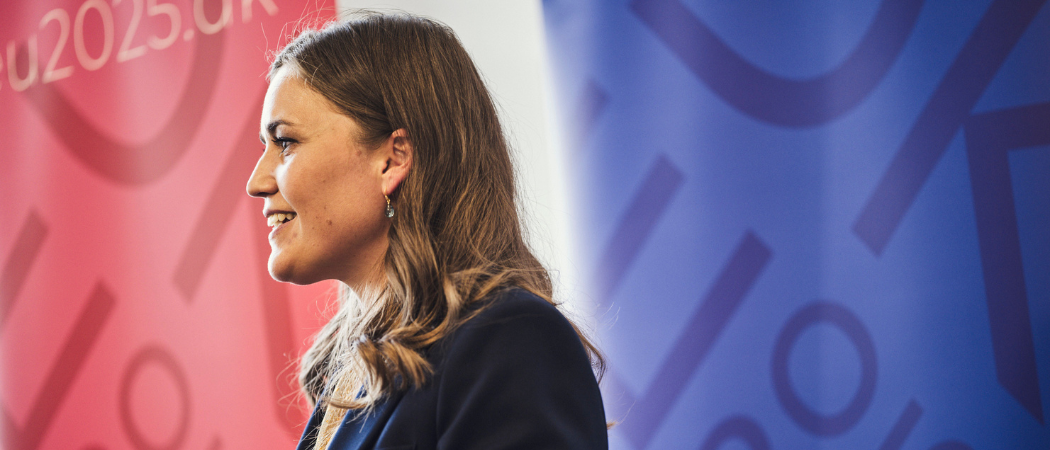With an emphasis on security and competitiveness, Denmark’s presidency comes at a critical time for the future of European research

Danish minister of European Affairs Marie Bjerre presenting the programme. Photo credits: Danish Presidency of the Council of the European Union / Flickr
The European research community responded positively to Denmark’s programme for its six-month presidency of the EU Council. This begins on July 1, shortly before the European Commission is due to publish its proposals for the next long-term EU budget and research and innovation programme.
The presidency programme, entitled “A strong Europe in a changing world,” puts an emphasis on ensuring European security and competitiveness, including through research and innovation and the green transition.
Denmark will “prioritise creating an optimal framework for excellent research and innovation, while simultaneously encouraging cooperation between public and private sectors,” in order to narrow the innovation gap in critical technologies with global competitors, according to the programme, published on June 19.
“There is a big role for universities to play here, as Europe cannot be truly innovative, and in turn competitive, without universities,” said Vinciane Gaillard, director of research and innovation at the European University Association.
The presidency will notably focus on Commission initiatives including the upcoming quantum strategy, the life sciences strategy, the start-up and scale-up strategy, and the strategy for research and technology infrastructures.
It also wants to address challenges around copyright and artificial intelligence, and could begin negotiations on the EU Space Act, which the Commission presented on June 25.
“It looks like it will be a very dynamic presidency with topics very close to the interests of our members,” said Emmanuelle Gardan, director of the Coimbra group of universities, citing priorities including democratic resilience, climate and energy, and security.
Gardan also welcomed the announcement of conferences to be held in Copenhagen towards the end of the year on AI in science, reforming research evaluation, and social sciences and humanities.
“We are hopeful that the Danish presidency will be able to make progress on the preparation of the next Framework Programme and the European Research Area Act,” she added. A Commission proposal for the latter is not expected before the second half of 2026.
Budget proposal
The next six months will play a crucial role in defining the future of European research funding, with the Commission currently slated to present its proposals for the next Multiannual Financial Framework and the next research Framework Programme, FP10, on July 16.
According to the programme, the Danish presidency will be prepared “to commence negotiations on possible proposals for legislative acts related to EU research and innovation efforts in the context of the next Multiannual Financial Framework.”
The Council is unlikely to agree its position on FP10 before the end of the year, but the months following the initial proposal will provide a crucial window for influencing the future programme, research organisations say.
Commission President Ursula von der Leyen has confirmed FP10 will remain a standalone programme, but questions remain around how it will be connected to the future European Competitiveness Fund.
Marta Agostinho, executive director of EU-Life, an alliance of life sciences research centres, says rumours that Horizon Europe’s Pillar 2, which supports collaborative research, could become part of the Competitiveness Fund are “extremely concerning,” as it could lead to calls for proposals being even more prescriptive and poorly suited to pre-competitive research.
Related articles
- Commission analysis lays bare fragmentation of European innovation
- Poland presents research and innovation priorities for Council presidency
Agostinho hopes that, under the Danish presidency, the Council will actively defend the position of collaborative research in the Framework Programme. “Later on, there will be much less space for these big strategic decisions,” she said.
She also welcomed the recognition in the programme of the importance of the life sciences for economic competitiveness. While Europe is no longer a leader in health research, there is still a lot of potential, for example when linking health, climate and biodiversity, she said. “The way the geopolitical landscape is developing provides us with some strategic opportunities to fill the gaps where most probably other regions will not be delivering so strongly in the near future.”
Research infrastructures, another presidency priority, are also “critical for us to be leaders in the life sciences,” she said. An effort is needed to ensure that every researcher in Europe can access research infrastructures and so become less reliant on digital infrastructure and databases located outside of Europe.





 A unique international forum for public research organisations and companies to connect their external engagement with strategic interests around their R&D system.
A unique international forum for public research organisations and companies to connect their external engagement with strategic interests around their R&D system.